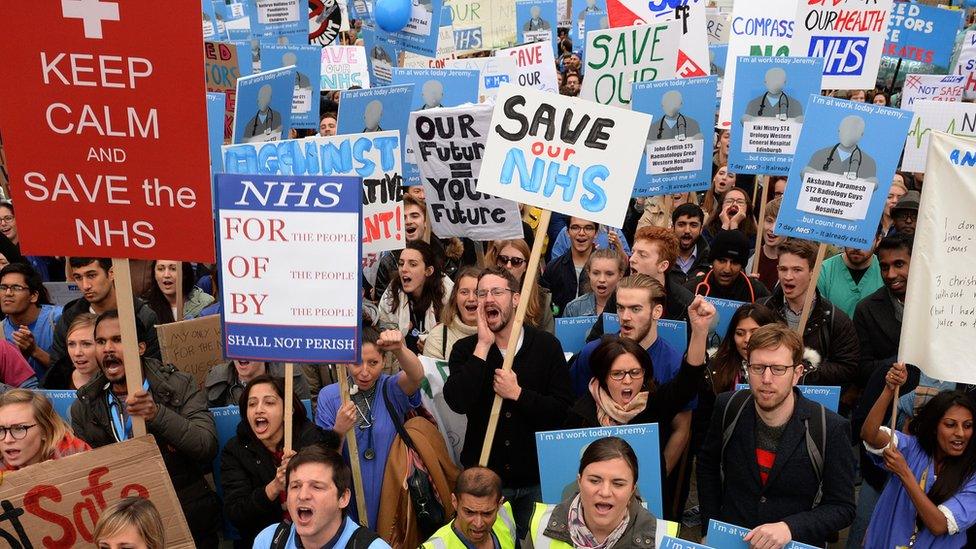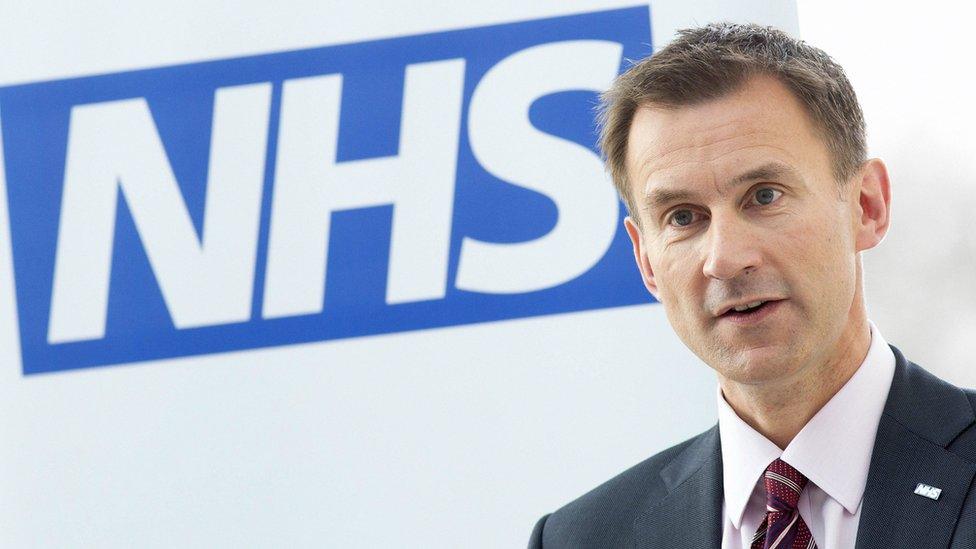Junior doctors' contract deal agreed
- Published

A deal has been agreed in the long-running dispute over a new junior doctors' contract in England.
Government negotiators and the British Medical Association leadership have reached an agreement after eight days of talks at conciliation service Acas.
Health Secretary Jeremy Hunt said the deal was a "significant step forward", while the BMA said it represented the "best and final way" to end the row.
The offer will now be put to a vote of over 40,000 BMA members.
That means it could still end up being rejected, but the fact the union and government have agreed a deal to end the stalemate is a major breakthrough.
These talks were seen as the last chance to get an agreement and were set up after a series of strikes, including the first-ever full walk-out by doctors.
It comes after the government announced in February it would be imposing the contract from this summer after previous talks failed.
The details released on Wednesday include several major changes:
the basic pay rise is to be reduced from 13.5% to between 10% and 11%
weekends will no longer be divided up between normal and unsocial hours, instead a system of supplements will be paid which depend on how many weekends a doctor works over the course of a year
extra pay for night shifts is to be reduced from 50% to 37%
extra support will be made available for doctors who take time out, such as women who go on maternity leave, to enable them to catch up on their training and thus qualify for pay rises - after claims women were being unfairly penalised
junior doctors will get an enhanced role in advising and liaising with the independent guardians who keep an eye on the hours doctors work
the deal remains cost-neutral, which means the government is not putting in extra money

Analysis: The beginning of the end?
The fact that something has been agreed is a major breakthrough. But this dispute is still a long way from being over. The BMA has promised its 40,000 members a vote on the agreement. That will be carried out in June and there are no guarantees the membership will give it the green light.
Junior doctors have been incredibly united throughout. Some 98% voted in favour of taking strike action last autumn and whenever union leaders have taken soundings since, the overwhelming sense has been that they have wanted to fight on.
If this hadn't been the case the leadership would probably have agreed a deal long before now. What will be interesting, and perhaps crucial, is just how strongly the BMA leadership tries to sell the agreement to members in the coming weeks.

BMA junior doctor leader Dr Johann Malawana said he was pleased to have reached a deal after "intense but constructive talks", adding it was the "best and final way" of resolving the dispute.
"Junior doctors have always wanted to agree a safe and fair contract, one that recognises and values the contribution junior doctors make to the NHS, addresses the recruitment and retention crisis in parts of the NHS and provides the basis for delivering a world-class health service.
"What has been agreed today delivers on these principles, is a good deal for junior doctors and will ensure that they can continue to deliver high-quality care for patients."
He said he would be recommending the deal to junior doctors ahead of the vote of BMA members, which will be run in June.

Mr Hunt said: "We welcome this significant agreement which delivers important changes to the junior doctors' contract necessary to deliver a safer seven-day NHS.
"The talks have been constructive and positive and highlighted many areas outside the contract where further work is necessary to value the vital role of junior doctors and improve the training and support they are given.
"This deal represents a definitive step forward for patients, for doctors and for the NHS as a whole."

Timeline of the dispute
December 2012 - The government invites the BMA for talks over new contract
October 2014 - BMA withdraws from talks
July 2015 - Independent pay review body publishes recommendations for a new contract
August 2015 - BMA refuses to re-enter talks
November 2015 - The government makes contract offer to junior doctors and BMA announces strikes
December 2015/January 2016 - Talks re-start at conciliation service Acas and strike for 1 December called off
January 2016 - First of four strikes, involving emergency cover being provided, is held
February 2016 - Ministers announce imposition of contract following second strike
April 2016 - First-ever all-out strike by doctors held in the history of the NHS
May 2016 - Talks restart after intervention by leaders at the royal colleges of medicine
